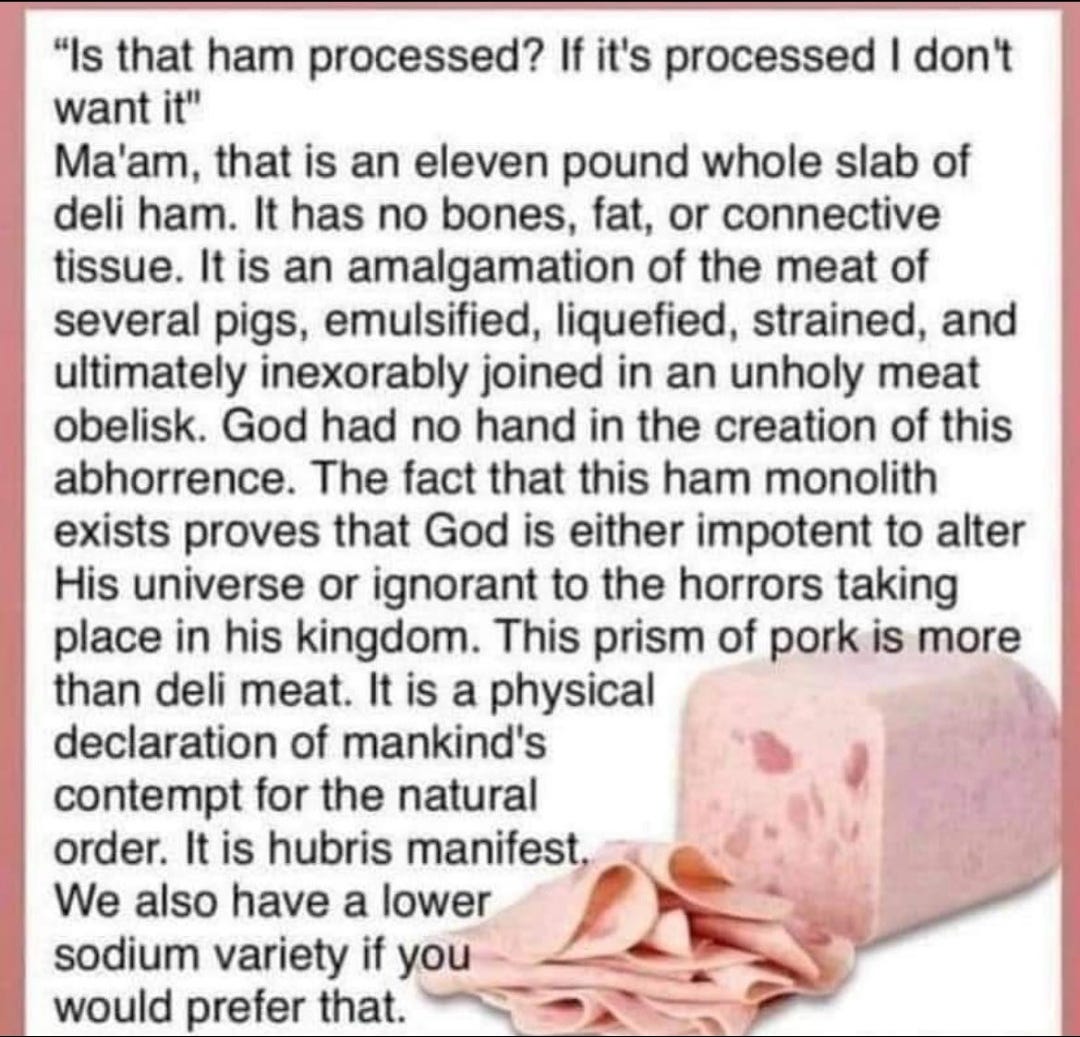The AI Pork Prism
It's not "slop", it's a metaphysical blind spot
This famous copypasta captures something I have spent years struggling to find words for: the intuition that there is something violent in the destruction of a thing’s inherent form. But there are many assumptions already at work here: not least the intuition that there’s even such a thing as an inherent form, a view both widely held and also low-status.
The deprecation of this distinction, between inherent and artificially imposed form, is one long-term consequence of a metaphysical punch-up that happened centuries ago, in which one side won so comprehensively the name of a noted thinker on the losing side became a colloquial term for “dumbass” that’s still in use, though its origin is mostly forgotten. And this long-discarded history in turn illuminates a very contemporary debate: about the proliferation of so-called “slop”, usually but not always in the context of machine-generated internet content.
This term is applied over-broadly, and is showing signs of backlash. But it gestures at a real metaphysical distinction, whose concealment was central to the scientific revolution but which is, in the transhuman era, boomeranging back at us with shocking force. And, like all the best memes - the ham monolith is so remarkable because it isn’t just funny; it also captures both the quintessence and the critique of “slop”, even as it gestures at the metaphysical framework whose disappearance fired the starting-gun on a metaphysical outlook that’s now careering us toward slopocalypse.
Mechanically Recovered Nature
The defining characteristic of “slop”, considered in the abstract, is formlessness. Whether it’s used in reference to excrement, peasant food, or machine-generated internet content, the word “slop” denotes something we assess as lower in value because it lacks some crucial inner structuredness. The “amalgamation of the meat of several pigs, emulsified, liquefied, strained, and ultimately inexorably joined in an unholy meat obelisk” derives its rhetorical punch and yuck value from the destruction of form, and the intuition that there is something disturbing about the abstract, reconstituted meat goo obelisk: the prism of pork.
But why is it disturbing? From inside the modern worldview, the only word we have for this distinction today is “unnatural”, a term that is itself fiercely contested:
What’s natural, and what’s artificial? Isn’t the idea of a pristine, untouched “Nature” just a Romantic invention? The debate has raged for centuries, and the winner at present is a view broadly consonant with Harari’s. This is a feelgood belief: both radically inclusive, and also offering justification for pretty much any technological intervention, because the result will be every bit as “natural” as anything else. Open-minded, and also masters of reality down to the atomic level? Nice people, and also powerful? Sounds ideal!
On the other side, we find a fractious assortment of Romantics, poets, reactionaries, hippies, health-food nuts, anti-capitalists, crunchy right-wingers, and assorted religious hold-outs (I’ve probably forgotten some other subtypes) all of whom, for sometimes contradictory reasons, cling to the idea that no: some things really are unnatural, and that’s probably bad? Once you get to why it might be bad, though, there’s usually just more arguing.
The real issue, though, is not the question of where nature ends and culture begins, but whether it’s meaningful at all to talk about things having a nature as such. Today this is difficult to litigate, or even to articulate, because the modern worldview began by bracketing this question and then slipped, by degrees, to dismissing it. Things may occur more or less “naturally” in relation to one another, but this is just complicated chains of cause and effect and not at all the same as having some kind of intrinsic nature. Obviously that’s not a thing. What are you, some kind of mystic? It’s all just atoms, whether they’re arranged pig-wise or pork-prism-wise.
The dismissal was then accompanied by a propaganda campaign against the older worldview, of such ruthless efficacy that its terms passed into ordinary language and its precepts became received opinion. But, as we’ll see, the successor worldview left important things out. And those things are now returning, in condensed and sometimes muddled meme-form, via “slop” discourse.
The Schoolmen Got Schooled
Keep reading with a 7-day free trial
Subscribe to Mary Harrington to keep reading this post and get 7 days of free access to the full post archives.



